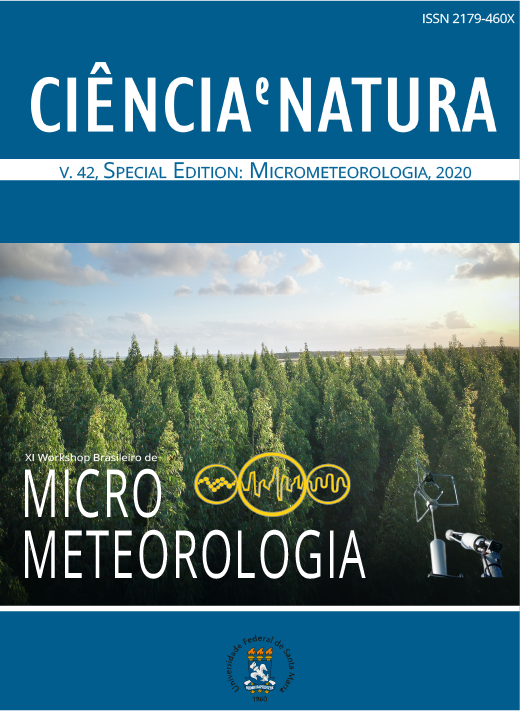Intercomparação de sensores de temperatura e umidade relativa para uso em campanha micrometeorológica
DOI:
https://doi.org/10.5902/2179460X46565Palavras-chave:
CalibraçãoTemperatura, Umidade Relativa, MicrometeorologiaResumo
Neste trabalho são apresentados os resultados de intercomparação de dois termohigrômetros CS500 com um anemômetro sônico e analisador de gases IRGASON recém-adquirido, a fim de aferi-los para posterior uso em uma campanha micrometeorológica. O experimento foi montado no sítio experimental do Reservatório do Rio Verde, em que todos os sensores mediram os dados no mesmo nível, sobre a superfície da água. Os dados comparados foram: (i) a temperatura do ar medida pelos CS500 e por um termômetro do IRGASON (modelo 107); e (ii) a umidade relativa dos CS500 com a umidade relativa obtida a partir da concentração de vapor d'água medida pelo analisador de gases do IRGASON. A comparação e os ajustes se deram por correlação linear e os resultados mostraram que os CS500 apresentaram grande robustez, não tendo sido constantadas diferenças significativas em relação aos dados do IRGASON.
Downloads
Referências
Campbell Scientific, I. IRGASON Integrated CO2/H2O Open-Path Gas Analyzer and 3D Sonic Anemometer — Instruction Manual. [S.l.: s.n.], 2015. 44 p.
CUNHA, C. L. N.; CARNEIRO, C.; GOBBI, E.; ANDREOLI, C. V. Eutrofização em Reservatórios: Gestão Preventiva - estudo interdisciplinar na Bacia do rio Verde, PR. 1. ed. Curitiba: Editora UFPR, 2011. v. 1. 515 p.
DIAS, N. L.; VISSOTTO, D. The effect of temperature-humidity similarity on bowen ratios, dimensionless standard deviations, and mass transfer coefficients over a lake. Hydrological Processes, Wiley-Blackwell, v. 31, n. 2, p. 256–269, 2017. ISSN 0885-6087. Disponível em: http://onlinelibrary.wiley.com/doi/abs/10.1002/hyp.10925.
LEMMA/UFPR. BACIA EXPERIMENTAL DO RIO VERDE. 2018. Disponível em: http://www.baciaverde.ufpr.br/.
SHUTTLEWORTH, W. J. Terrestrial hydrometeorology. [S.l.]: John Wiley & Sons, 2012.
Downloads
Publicado
Como Citar
Edição
Seção
Licença
Para acessar a DECLARAÇÃO DE ORIGINALIDADE E EXCLUSIVIDADE E CESSÃO DE DIREITOS AUTORAIS clique aqui.
Diretrizes Éticas para Publicação de Revistas
A revista Ciência e Natura está empenhada em garantir a ética na publicação e na qualidade dos artigos.
A conformidade com padrões de comportamento ético é, portanto, esperada de todas as partes envolvidas: Autores, Editores e Revisores.
Em particular,
Autores: Os Autores devem apresentar uma discussão objetiva sobre a importância do trabalho de pesquisa, bem como detalhes e referências suficientes para permitir que outros reproduzam as experiências. Declarações fraudulentas ou intencionalmente incorretas constituem comportamento antiético e são inaceitáveis. Artigos de Revisão também devem ser objetivos, abrangentes e relatos precisos do estado da arte. Os Autores devem assegurar que seu trabalho é uma obra totalmente original, e se o trabalho e / ou palavras de outros têm sido utilizadas, isso tem sido devidamente reconhecido. O plágio em todas as suas formas constitui um comportamento publicitário não ético e é inaceitável. Submeter o mesmo manuscrito a mais de um jornal simultaneamente constitui um comportamento publicitário não ético e é inaceitável. Os Autores não devem submeter artigos que descrevam essencialmente a mesma pesquisa a mais de uma revista. O Autor correspondente deve garantir que haja um consenso total de todos os Co-autores na aprovação da versão final do artigo e sua submissão para publicação.
Editores: Os Editores devem avaliar manuscritos exclusivamente com base no seu mérito acadêmico. Um Editor não deve usar informações não publicadas na própria pesquisa do Editor sem o consentimento expresso por escrito do Autor. Os Editores devem tomar medidas de resposta razoável quando tiverem sido apresentadas queixas éticas relativas a um manuscrito submetido ou publicado.
Revisores: Todos os manuscritos recebidos para revisão devem ser tratados como documentos confidenciais. As informações ou ideias privilegiadas obtidas através da análise por pares devem ser mantidas confidenciais e não utilizadas para vantagens pessoais. As revisões devem ser conduzidas objetivamente e as observações devem ser formuladas claramente com argumentos de apoio, de modo que os Autores possam usá-los para melhorar o artigo. Qualquer Revisor selecionado que se sinta desqualificado para rever a pesquisa relatada em um manuscrito ou sabe que sua rápida revisão será impossível deve notificar o Editor e desculpar-se do processo de revisão. Os Revisores não devem considerar manuscritos nos quais tenham conflitos de interesse resultantes de relacionamentos ou conexões competitivas, colaborativas ou outras conexões com qualquer dos autores, empresas ou instituições conectadas aos documentos.






